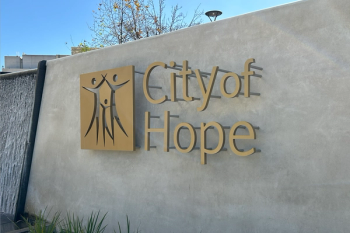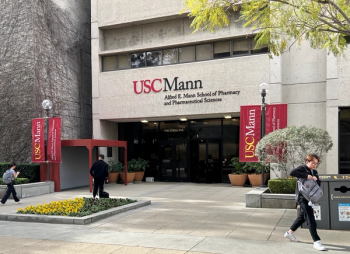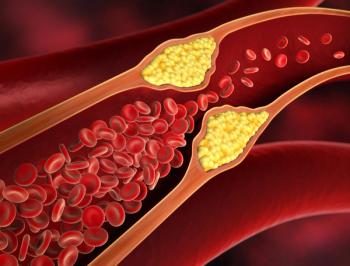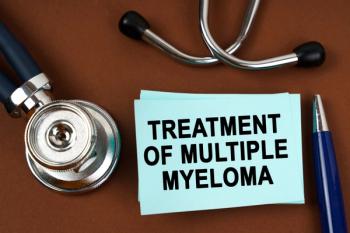
Sharita Howe, PharmD, discusses her recent acknowledgement by MM+M, who acknowledged her as a part of the next wave of health care leaders in their recognition of 40 under 40 leaders in health care.
Alana Hippensteele is lead editor at Pharmacy Times®, Contemporary Clinic, and Pharmacy Times Oncology Edition®. She has a master's in Critical Theory and Creative Research from Pacific Northwest College of Art and a bachelor's degree in English and Art History. She has worked as an English instructor at Temple University and held editorial positions at American Cleaning & Hygiene and Tin House.

Sharita Howe, PharmD, discusses her recent acknowledgement by MM+M, who acknowledged her as a part of the next wave of health care leaders in their recognition of 40 under 40 leaders in health care.

David S. Bateshansky, PharmD, BCOP, discusses his role as an oncology pharmacist at USC Norris Comprehensive Cancer Center, noting the evolving recognition of pharmacists' contributions on cancer care teams.

The health care community was left largely unaware of the controversy that occurred at one of the clinical trial sites.

Wafa Samara, PharmD, vice president and chief pharmacy officer at City of Hope, highlights the vital role of oncology pharmacists at City of Hope in improving patient outcomes, conducting and leading research, and working as integral members of the multidisciplinary care team.

Conference Co-Chair and American Association for Cancer Research (AACR) Past President Elaine R. Mardis, PhD, explains that the conference provides pharmacy professionals with insights into the application of large-scale cancer genomics studies to real-world therapeutic responses.

Amir Ali, PharmD, BCOP, discusses his experience as an oncology pharmacist in both direct and indirect patient care at the University of Southern California (USC) Norris Comprehensive Cancer Center.

New drugs and collaborative care may be key to overcoming trial closures, weak guidelines, and inefficiencies.

The administration of immunotherapy in adjuvant, neoadjuvant, and perioperative settings offers distinct benefits and challenges in resectable cancers, with recent clinical trials highlighting its potential to improve long-term outcomes and the need for further research into biomarkers and combination strategies.

The FDA’s accelerated approval of lifileucel (Amtagvi; Iovance Biotherapeutics) marks a major milestone in immunotherapy for metastatic melanoma, building on decades of research in tumor-infiltrating lymphocyte therapy.

Immunotherapy pioneer James P. Allison, PhD, revolutionized cancer treatment by discovering immune checkpoint blockade, leading to significant advances in survival rates and ongoing efforts to optimize immuno-oncology strategies.

Advancements in neoantigen vaccines and immunotherapy are transforming cancer treatment by leveraging genomic sequencing to overcome tumor heterogeneity and therapeutic resistance.

Melody Smith, MD, MS, discusses how microbiome modulation may influence CAR T-cell therapy toxicity and outcomes, highlighting potential future interventions and clinical integration challenges.

The AACR Immunotherapy Conference 2025 will provide pharmacists with the opportunity to engage with cutting-edge cancer immunotherapy research, explore advancements in treatments, such as immune checkpoint inhibitors and CAR T-cell therapy, and connect with key leaders in the field.

Melody Smith, MD, MS, discusses how the intestinal microbiome influences CAR T-cell therapy outcomes, highlighting the negative impact of certain antibiotics and the potential role of dietary interventions in improving treatment efficacy.

C. Brooke Adams, PharmD, BCOP, discusses the evolving diagnostic criteria and management strategies for cytokine release syndrome (CRS) and immune effector cell-associated neurotoxicity syndrome (ICANS) in CAR T-cell therapy, highlighting advances in toxicity prevention and treatment selection.

The expanding role of real-world evidence in regulatory and health technology assessment (HTA) decision-making highlights its growing acceptance for supplementing clinical trial data, addressing evidence gaps, and informing treatment value, despite challenges in data quality, accessibility, and regulatory compliance.

Diversity in clinical trials remains important to ensure research data for therapies accurately reflects the diverse patient populations who will use them globally.

Africa's unparalleled genetic diversity presents both a challenge and an opportunity to advance precision medicine, with a focus on leveraging pharmacogenetics to improve drug efficacy and reduce adverse reactions.

Catriona Jamieson, MD, PhD, discusses the role of stress-activated base editors like ADAR1p150 and APOBEC enzymes in cancer progression and highlights innovative approaches to halt these processes and improve therapeutic outcomes.

γδ T cells are emerging as a transformative immunotherapy approach in oncology, offering unique mechanisms for targeting hematologic and solid tumors, with clinical trials demonstrating promising survival outcomes and durable immune responses.

Pharmacists can improve hyperkalemia management through collaboration and innovation.

Challenges include therapy gaps, nonadherence, and fragmented care.

Managing bispecific antibodies requires collaboration and meticulous protocols.

Pharmacists bridge communication gaps and enhance shared decision-making.

A study in Lancet Haematology revealed that minority ethnic patients face significantly poorer outcomes after hematopoietic cell transplantation compared to White patients.

The phase 3 CEPHEUS trial demonstrated that adding daratumumab (DARA) to the VRd regimen significantly improves minimal residual disease negativity, progression-free survival, and overall response in transplant-ineligible or transplant deferred patients with newly diagnosed multiple myeloma, establishing a new standard of care.

The GMMG-HD7 trial evaluated the addition of isatuximab to standard induction therapy in patients with newly diagnosed multiple myeloma who are eligible for autologous stem cell transplantation, demonstrating significantly higher rates of minimal residual disease negativity and improved progression-free survival (PFS).

The phase 3 AMPLIFY trial demonstrates that fixed-duration regimens of acalabrutinib and venetoclax, with or without obinutuzumab, significantly improve progression-free survival and deliver manageable safety profiles compared to chemoimmunotherapy in treatment-naive chronic lymphocytic leukemia (CLL).

The AQUILA study demonstrates that early treatment with daratumumab significantly delays progression to symptomatic multiple myeloma, improves survival outcomes, and offers a well-tolerated alternative to traditional observation.

A ketogenic diet and its key metabolite, β-hydroxybutyrate, enhance the efficacy of CAR T-cell therapy by improving metabolic fitness, cytokine production, and cellular expansion, offering a promising, safe strategy for optimizing cancer immunotherapy.